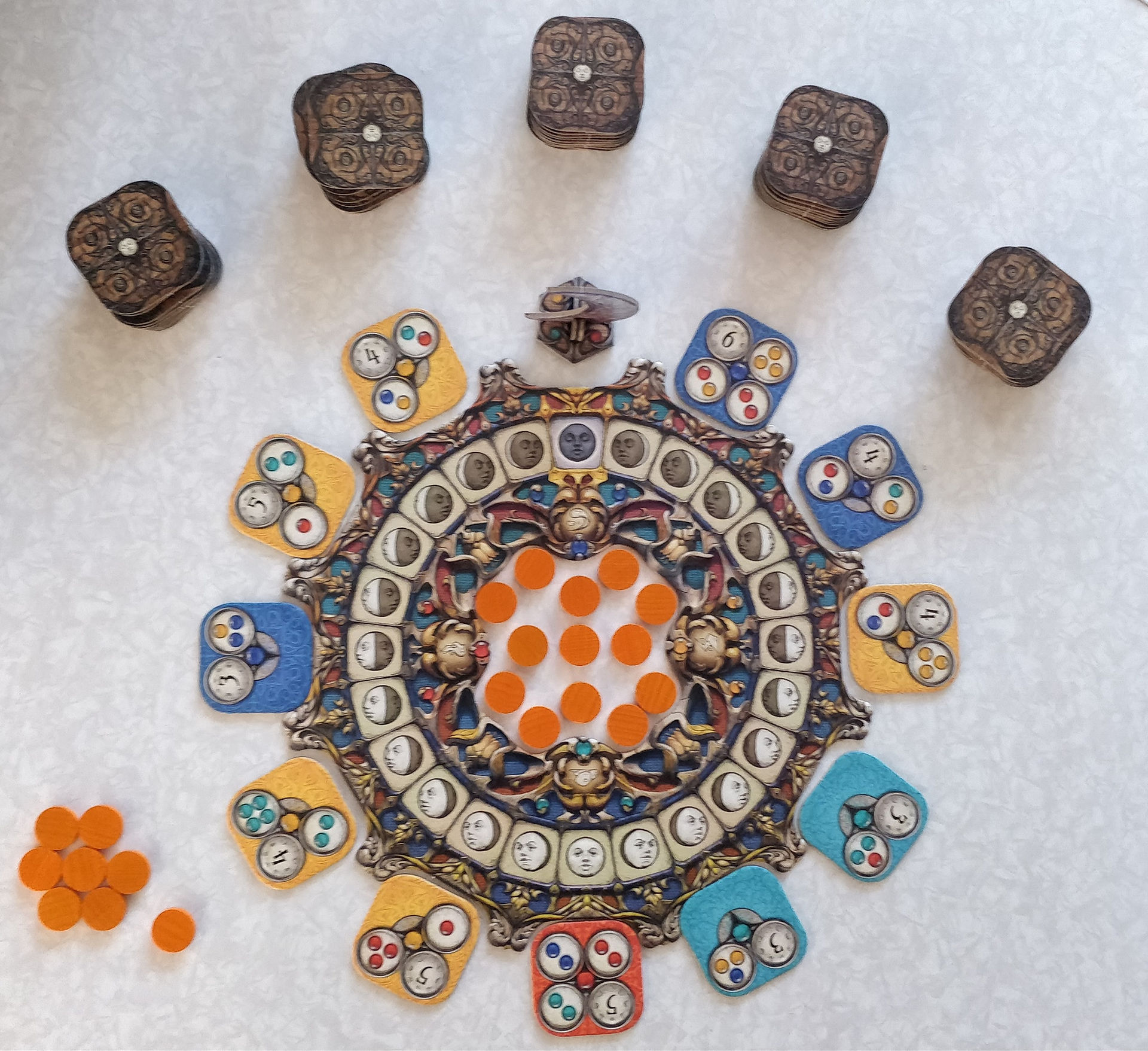Cash Grabs Everywhere!
Welcome to a summer grumpy post.
It all started when a new video popped up on the BGG front page, freshly uploaded by esteemed BGG News writer, W. Eric Martin. The title itself is ambiguous: in big fonts on the video still, you can read "In defense of the cash grab" (a provocative title if any), but the video title actually is: "Are publishers trying to steal your money?" I will come back to this ambiguity later on.

A grumpy gamer representation by W. Eric Martin
In this video, W. Eric Martin addresses people's complaints regarding "money grabbing" practices by the publishers trying to "trick people into buying games", or to "rip people off". To which W. Eric Martin's judgment immediately follows: "I don't understand this type of comment, I am baffled when people make it." He then explains that these people are trying to say one of three things:
1) people are not interested in this particular game (e.g. a spin-off that doesn't interest the original fans);
2) people complain because some new content is tied to a new edition;
3) people are arguing against the way the publishers are selling their games (loot boxes, booster packs).

W. Eric Martin impersonating BGG users to ridicule them
Among the few arguments he offers to counter these views are:
- companies are here to make money and it's weird to object to that
- you are not the entire market, tons of other people love it (for random booster packs)
- there are production reasons and manufacturing reasons behind everything that happens
- companies are going to money grab... as long as they are delivering what they promised, that makes sense, what's the objection?

1) People matter more
That would be my first point. On BGG, I am often criticized, mocked, shunned, because of the negativity I show towards some games. Yet I always try to be nice and friendly to people. To me, people matter more than games (an arguable point, I agree). So, OK, let's say W. Eric Martin wants to make a video to argue against a certain view. Why make it in a way that aims at ridiculing people? Is defending games and publishers so crucial, that it justifies such a show of spite? I certainly do not believe so.
Some may say that criticizing a game is criticizing the hard work of a designer, and therefore a lack of sensitivity towards an actual person. Well, first of all, if I were a creator of anything, I wouldn't try to lurk around places where people casually chat about my works, because it may be painful to hear (that is, unless I am curious about some raw, unfiltered feedback). Second, the designer and their game are not the same thing. I am a researcher. I can spend months on a paper that may then get trashed by my colleagues and rejected. It's sad, I don't like it, but they don't know me, I don't know them, and I need to accept that my work won't please everyone. Actually, WEM's comment that not everything is bound to please you has the exact dual version that not everyone is bound to be pleased with what you do. If you can't criticize a game because of the former, then the latter applies and criticizing a game shouldn't hurt the designer anyway, because it will just happen that some people don't like it.
A last anecdote on this one. On the last BGG announcement of the Spiel des Jahres winners, Challengers got discussed a lot. What does it mean about the Kennerspiel that this game wins? How to explain the surface discrepancy between Challengers and the other two nominees in terms of design complexity and meatiness? It yielded some interesting answers actually. But then you get a comment like this (don't read it, it is about as much devoid of interest as a comment on page 7 of a lengthy BGG argument can be):

Just notice the last bit: "How dare they?", that is, an impersonation again that aims to ridicule people who criticize the gaming industry, to make them look like a bunch of poorly informed baboons. And guess who supported that with a tip of GeekGold?

2) BGG is part of the industry
The first thing I noticed when I watched the video was the copy of My Island on the shelf behind WEM. You may not have heard of it yet (it's not a solo game so don't blame us for it), but it's the upcoming sequel of Knizia's My City. Yes, upcoming. WEM is receiving games for free. He's paid for writing about them. We, random gamers in the wild, need to pay for our games. We need to find time to play them, squeeze them into the crevices of our often busy lives. So, of course, our perspective will be different. Of course, we may get grumpy if one bit of a game we love is only published alongside a big box full of stuff we already owned.
Besides, big boxes disrupt the second-hand market. When a new, upgraded edition is out, it's very hard to re-sell your old edition in the second-hand market, so if you want the new stuff, you will likely get stuck with both. Obviously, the publishers don't care about the second-hand market (why would they, unless it threatens them?), but we do, because games pile up fast. If we grow into the lunacy of following the pace of the publishers' releases, the pace of the BGG news announcement, we need to trim our collection along the way. But of course, it's a highway for fools, as we shall never run fast enough, unless we are part of the industry, that is.
Therefore, it strikes me as extremely weird to criticize people on the outside from the inside. A lot of parallels come to my mind, but it's best to stop here.

3) Criticism is legitimate and doesn't need to be informed
That's my most important point. In many ways, the message of this video amounts to: criticism is not legitimate. You just shouldn't critic games! You don't like a game? It only means it's not for you. You feel excluded by the last Shards of Infinity saga box? Well, it's just meant for another audience. Besides, the publisher's goal is to keep afloat. Your particular needs and wants are just of zero relevance. And if you criticize that, you just didn't understand the video, because there is no point, really. And it's no wonder that the video starts and ends with it: "I don't understand these comments" and; "what's the objection?". It's a direct attempt to shatter the very legitimacy of criticism.
Another attempt to cut down legitimacy is to portray the grumpy people as a bunch of misled buffoons. Mimicking their offended stance ("How dare they!"), making faces, and moreover: trying to show that they are just morons by switching the issue towards something that has an obvious answer - are publishers trying to steal your money? Of course, they aren't! But to believe that lobbying, advertising, influencing, play no part, that the publishers/customers relationship is a strictly professional and neutral one, is simply delusional - and I do esteem W. Eric Martin too much to believe he is. Choosing whether to buy a game or not is never a free choice, even when you have the money for it. Our decision power is not entirely ours to exert.
Otherwise, industries would never pay billions for advertising, there wouldn't be money-fed Quackalopes muttering into your ears how great games are, there wouldn't be sales, promotional events, early birds, Kickstarter exclusives, and so on, and so on... To profess such a naive view of things, from someone who claims to be privy to the industry, is no longer what I deem a decent stance. Because, yes, there is an issue, and of course, people should complain, discuss, share views, and gain better insights along the way into what they want, what they are willing to accept, and how what they want and what they are willing to accept is being shaped by an information system engineered for it!
And it's very much important to recognize that criticism is for granted. Criticism is the exercise of doubt, the unwillingness to accept things at face value. It shouldn't require any specific knowledge. So, to conclude the discussion by saying that there are very good reasons for things to be as they are, and all is for the best except we don't know the boring details of manufacturing and licensing and whatever, is very much trying to deny people's the right to criticize the industry because they are not part of it. How dare they complain about what they don't know!
So, here on Solitaire Times, we may be a bunch of angry baboons, no smarter than a box of rocks. But we sure know that we don't need anyone's approval to do what we do best: grumpiness!

